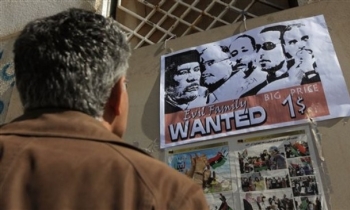On a sweltering summer day of August 11, 2003, Reda Helal left his office like any other day, but this time never to reach home. No one knows where he disappeared, nor is anyone bothered to know. Today, Reda Helal, a senior editor at Egypt’s daily Al-Ahram, has been long forgotten.
Four years after Helal disappeared in central Cairo, in a special report 'The Forgotten Man', the Committee to Protect Journalists (CPJ) has traced the last known movements of Helal. Some Egyptian journalists believe Helal was a victim of an "enforced disappearance" undertaken by domestic or foreign security agents.
The near-total absence of information about his fate has perplexed and unsettled Egyptian journalists. Equally perplexing has been the attitude of national media on the case, especially Helal’s own newspaper, Al-Ahram. Despite being one of the largest and best-known newspapers in the Arab world, it has barely published a word about him in four years.
No matter how shoddy Egypt’s human rights and press freedom records have been, the “enforced disappearance†or murder of a journalist is rare, especially when the one involved is a senior staff at a prominent, pro-government leading daily such as Al-Ahram.
“The responsibility of the mysterious disappearance of our colleague Reda Helal rests on the shoulders of the state and the government,†said Gamal Fahmy, an Egyptian columnist and board member of the Egyptian Journalists Syndicate. “This terrible silence has been going on for years, and it can only make people more suspicious.â€
According to the accounts available, Helal began his day on August 11 routinely and left for work before 10. After spending several hours in his Al-Ahram’s office situated at Gala’ Street in downtown Cairo, he left for home. At around 2:40 pm, a driver working for the newspaper drove Helal to his apartment and supposedly dropped him off at the entrance. It was the last time anyone reported seeing him.
After two days, his brother, Sayed Helal was called up by his colleagues to know his whereabouts, as he had not shown up for work. Sayed, who lives in the Nile Delta city of Mansoura, rushed to Cairo. He broke into the apartment with the help of the doorman. Nothing unusual appeared in the apartment. The only aberrations seemed to be the windows oddly left open in the reception room and the fax and answering machines that were unplugged.
Sayed said he had spoken to his brother only a day before the disappearance and had picked up nothing abnormal. He reported his brother missing to the nearby Sayeda Zeinab police station.
Egyptian police and security forces launched what Al-Ahram described as an “intensive†and “high-level†search for the missing editor. Throughout their investigation, Egyptian security officials have remained tightlipped, although Al-Ahram offered a glowing account of their early work on the case.
“The security investigation team headed by Habib al-Adly, the interior minister himself, and comprising 300 officers has not left a single thread, whether political or criminal, local or international, without tracking it down,†the newspaper reported on August 23, 2003. “But such apparatuses usually work in a secretive and discreet manner, since they believe that what really matters is the conclusion and that announcements may give rise to gossip defaming the innocent.â€
Security officials claim that Helal’s disappearance had no political connection and the reason for disappearance can be personal. The state-backed Al-Akhbar published transcripts of voice messages allegedly left on Helal’s answering machine, including several from women, one of whom reminded Helal about an upcoming party being hosted by the US ambassador. But after several months, when no success could be achieved in the case, officials told Sayed that the investigation had come to a standstill due to lack of further leads.
Speculations and rumour mills have worked overtime since Helal’s disappearance. Egyptian tabloids and pan-Arab newspapers occasionally published dubious, unsubstantiated reports that Helal was seen abroad, that he was in Israel, or that he had been detained by the security apparatus of an unnamed country because of a supposed big scoop he was about to publish. Many felt that foreign intelligence agents were behind the disappearance, while others said the job was done closer to home. According to one story, he made it to a neighbouring country.
However, the most widely reported development emerged in July 2005, when the Egyptian Islamic Jihad stated it had killed Helal shortly after abducting him. A threatening email was sent to Egyptian secular writer Sayyed al-Qimni claiming the murder and informing him that he would meet the same fate as Helal, whom the group “brought down by bullets.â€
With few exceptions, journalists, human rights activists and influential Islamists have discounted the claim’s authenticity, noting that the email was sent long after the disappearance and that Helal, though a tough critic, was not regarded as a top enemy of militants.
In the pages of Al-Ahram, Helal was known as a liberal writer, critical of nationalist and Islamic discourse, which he blamed for the Arab world’s lack of democracy. In his last column for Al-Ahram, published the day before he disappeared, under the headline “The Crisis of Democracy in the Arab Worldâ€, Helal criticised recent elections within the Egyptian Journalists Syndicate.
Unlike most Egyptian columnists, he supported the US-led invasion of Iraq and was a strong backer of Egypt-Israel relations. He also criticised Arab intellectuals who sympathised with deniers of the Holocaust. “It is not in our interest to deny the Holocaust, because we are not responsible for it, and we should not sympathise with those who should be blamed for it,†he told the Al-Ahram weekly in 2000.
However, his work was not the sorts that would cause danger to him. His political views were being discussed in official circles, even if they were widely criticised. Moreover, Helal had strong contacts with high profile key persons in power. Any political reason for the abduction seems to be nonconforming.
A few anomalies in the case raise questions. Many observers find it difficult to believe that the authorities have no information about the editor’s fate. Egypt’s multilayered security apparatus is among the most sophisticated and omnipresent in the region. The area where Helal was said to have gone missing is regarded as one of the most secure in the entire city.
Although, Al-Ahram has reported that its driver left Helal on the gates of his apartment, the doorman denies seeing him that afternoon. Al-Ahram also rebuffed Sayed’s requests to speak directly with the driver.
The silence continues as the fourth anniversary of Helal’s disappearance passed largely unnoticed. Yet the family and a handful of journalists have not lost hope. Till then, a laptop rests on the working desk in Helal’s apartment awaiting its next contentious article.









